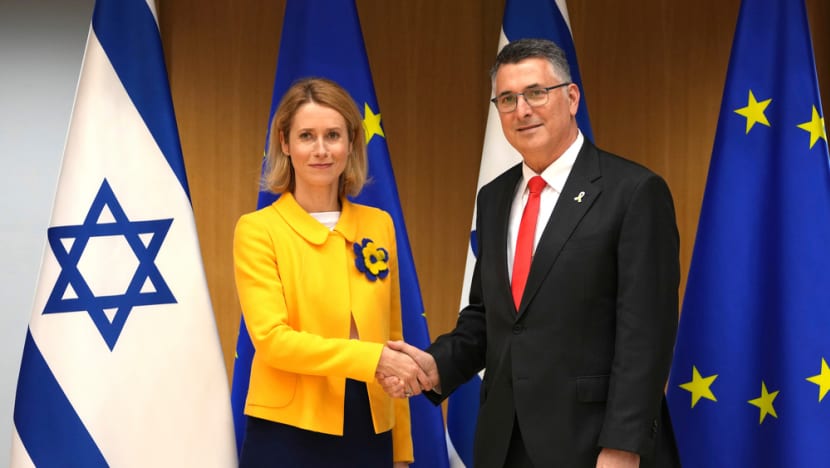World
EU Keeps Options Open for Action Against Israel Over Gaza Crisis

The European Union (EU) has stated it may consider measures against Israel if humanitarian conditions in Gaza do not improve. On July 15, 2024, EU foreign policy chief Kaja Kallas outlined ten potential actions after identifying breaches of a cooperation agreement with Israel concerning human rights violations. These measures could include suspending the accord, restricting trade, imposing sanctions on Israeli officials, instituting an arms embargo, and halting visa-free travel.
Despite the growing humanitarian crisis in Gaza, EU foreign ministers convening in Brussels did not reach a consensus on implementing any of these measures. Kallas emphasized the EU’s commitment to improving conditions in Gaza, stating, “The aim is not to punish Israel. The aim is to really improve the situation in Gaza.”
Recent Developments and Humanitarian Efforts
Last week, Kallas announced an agreement with Israel aimed at opening additional border crossings and increasing food supplies to Gaza. On July 14, she reported some “positive signs,” including the restoration of electricity, provision of water, and enhanced humanitarian aid deliveries. However, she noted that more substantial changes are necessary for meaningful improvements in the lives of Gaza’s approximately two million residents, who continue to face severe challenges due to ongoing aid restrictions amid Israel’s military response to Hamas.
Irish Foreign Minister Thomas Byrne commented on the situation, indicating that Kallas plans to provide updates to EU member states every two weeks regarding humanitarian access. He expressed concern over the slow implementation of these measures, stating, “So far, we haven’t really seen the implementation of it, maybe some very small actions, but there’s still slaughter going on.” Byrne emphasized the need for the EU to leverage its influence effectively.
Internal Divisions and Historical Context
The EU’s consideration of punitive measures represents a notable shift, as the bloc previously hesitated to take strong action against Israel. This change follows Israel’s military operations that resumed in March 2024 after a ceasefire collapsed. Despite the EU’s discussions, deep divisions among member states persist, with some countries firmly supporting Israel while others align more closely with Palestinian interests.
Israel’s foreign minister, Gideon Saar, had anticipated no immediate action from the EU, a prediction that was confirmed during the recent meeting. The ongoing conflict, which escalated after Hamas launched an attack on Israel on October 7, 2023, has resulted in a significant death toll. Reports indicate that approximately 1,219 individuals, mostly civilians, have died in Israel due to the initial attack, while Gaza’s health ministry claims that at least 58,386 Palestinians, predominantly civilians, have been killed during Israel’s retaliatory operations. The United Nations considers these figures credible.
Indirect negotiations between Israel and Hamas regarding a potential ceasefire have been ongoing for two weeks but currently appear to be stalled. As the situation evolves, the EU’s future actions will be closely monitored by both member states and humanitarian organizations looking for substantial improvements in Gaza.
-

 World5 months ago
World5 months agoSouth Korea’s Foreign Minister Cho Hyun to Visit China This Week
-

 Business5 months ago
Business5 months agoStarling Bank Plans Secondary Share Sale, Targeting $5.4 Billion Valuation
-

 Top Stories5 months ago
Top Stories5 months agoMunsang College Celebrates 100 Years with Grand Ceremony
-

 World5 months ago
World5 months agoPAS Aims to Expand Parliamentary Influence in Upcoming Election
-

 Business7 months ago
Business7 months agoKenvue Dismisses CEO Thibaut Mongon as Strategic Review Advances
-

 Lifestyle6 months ago
Lifestyle6 months agoHumanism Camp Engages 250 Youths in Summer Fest 2025
-

 Sports6 months ago
Sports6 months agoDe Minaur Triumphs at Washington Open After Thrilling Comeback
-

 Sports7 months ago
Sports7 months agoTupou and Daugunu Join First Nations Squad for Lions Clash
-

 Top Stories7 months ago
Top Stories7 months agoColombian Senator Miguel Uribe Shows Signs of Recovery After Attack
-

 World7 months ago
World7 months agoASEAN Gears Up for Historic Joint Meeting of Foreign and Economic Ministers
-

 Health6 months ago
Health6 months agoNew Study Challenges Assumptions About Aging and Inflammation
-

 Business7 months ago
Business7 months agoOil Prices Surge Following New EU Sanctions on Russia









